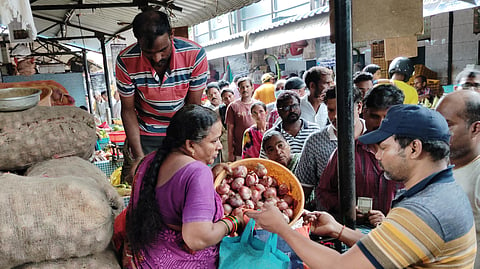

VIJAYAWADA: As Vijayawada struggles to recover from the floods, the prices of essential goods, especially vegetables, have surged. The floods have left crops completely waterlogged, worsening the already dire situation.
Milk has become scarce in the city, fuelled by rumours that production at the local dairy had ceased and that milk would not be available until the floodwaters recede on August 31. On Tuesday, while milk was still available at regular prices in some areas, others saw prices skyrocket, with some residents paying as much as Rs 100 per packet to ensure their children were provided for.
The spike in vegetable prices is reminiscent of the hikes seen during the COVID-19 pandemic, further aggravating the plight of ordinary citizens. Frustrated by the rising costs, residents are calling on the government to intervene and stabilise prices.
“The daily increase in vegetable prices, particularly compared to essentials like dal and oil, has become a severe burden for poor and middle-class families already struggling with the flood crisis,” said Durga Bhavani from Nidamanuru. She urged the State government to take immediate steps to control the prices of staple vegetables.
The price hike has also impacted Rythu Bazars, where some vegetables have doubled in cost. K Koteswara Rao, an Estate Officer, explained that vegetable prices have spiked in both the market and Rythu Bazars due to the severe flooding. He noted that, despite the increases, prices at Rythu Bazars are still lower than those in the retail market.
In the retail market, prices are even more extreme. Sk Saba, a vegetable vendor near the BSNL Office in Vijayawada, confirmed that vegetable prices have soared over the past four days as crops were submerged in rain and floodwaters.
With no transportation of vegetables from other regions, the situation is expected to worsen, with prices likely to rise further.
Prices less in Rythu Bazars
K Koteswara Rao, an Estate Officer, explained that vegetable prices have spiked in both the market and Rythu Bazars. He noted that prices at Rythu Bazars are still lower than those in the retail market